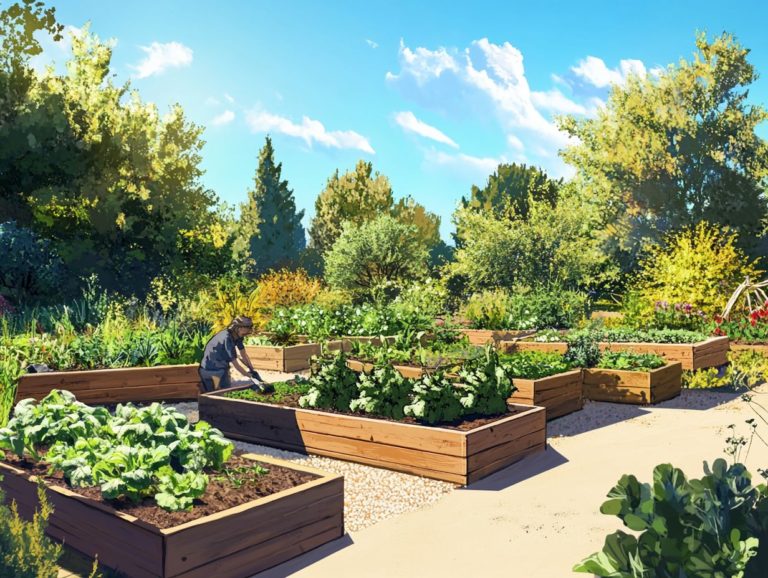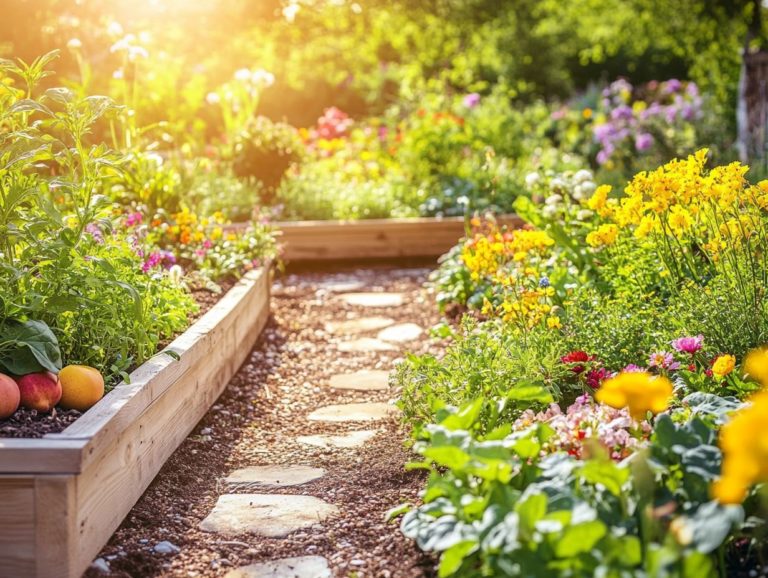How to Monitor and Improve Your Garden’s Health?
A thriving garden can truly be a source of beauty and joy, but maintaining its health demands more than simply watering and weeding.
Understanding the various factors that influence your garden’s vitality can make all the difference in its flourishing.
You will explore the key indicators of an unhealthy garden, simple ways to check your garden, and actionable strategies to enhance both soil and plant health.
By the end, you will possess the knowledge needed to nurture your garden into a flourishing oasis for years to come.
Contents
- Key Takeaways:
- Understanding Your Garden’s Health
- Signs of an Unhealthy Garden
- Methods for Monitoring Garden Health
- Improving Garden Health
- Maintaining a Healthy Garden
- Frequently Asked Questions
- What are effective ways to check my garden’s health?
- What are some common signs of an unhealthy garden?
- How can I improve my garden s health?
- What are some natural ways to enhance my garden’s health?
- Why is it important to monitor and improve my garden s health?
- How often should I monitor my garden s health?
Key Takeaways:

- Regularly assess your garden’s health by observing plant growth, soil quality, and pest activity to prevent potential issues.
- Watch for signs of an unhealthy garden, such as wilting plants, yellowing leaves, and pests, which can be addressed by improving soil and plant health.
- Keep your garden healthy by implementing strategies like crop rotation, organic fertilizers, and proper watering techniques for long-term success.
Understanding Your Garden’s Health
Understanding your garden’s health is crucial for fostering thriving plant growth and maintaining a balanced ecosystem. By focusing on key factors like soil health, biodiversity, and simple ways to check your garden, you can significantly enhance your garden’s resilience.
A healthy garden nurtures beneficial organisms, manages pests and diseases, and encourages community participation, all of which contribute to vibrant gardening culture.
Use expert resources like RHS Gardening Advice and the National Audubon Society for valuable insights on sustaining vibrant and sustainable gardens through the seasons, especially since the gardening landscape has evolved since April 1997.
Factors that Impact Garden Health
Several factors can profoundly influence your garden’s health, including soil quality, water management, and pest and disease control.
Understanding these elements is essential for any gardener seeking a thriving landscape. For instance, soil composition, or the mix of materials in your soil, is especially important; nutrient-rich, well-draining soil cultivates stronger root systems and healthier plants.
Implementing effective pest management strategies is vital to prevent destructive infestations that can stifle growth and diminish yields.
The importance of water infiltration cannot be overstated; proper drainage ensures that your plants receive the moisture they need without the risk of drowning in excess water. By incorporating organic matter, such as compost, you can improve soil structure and encourage microbial life, fostering a more resilient garden ecosystem.
Signs of an Unhealthy Garden
Spotting the signs of an unhealthy garden is crucial! Don t wait until it s too late! You ll often find indicators such as wilting plants, discolored leaves, and unwelcome pests, all of which can reveal underlying plant diseases or nutrient deficiencies.
Keeping a close eye on your garden and maintaining detailed records are crucial practices that help you spot these issues early. By understanding the symptoms of an unhealthy garden, you can implement effective disease prevention strategies, restoring vitality while steering clear of harmful pesticides.
Identifying Common Issues

Identifying common issues in your garden is essential for preventing significant damage and fostering better management practices.
As a garden enthusiast, you often encounter various pests like aphids, slugs, and spider mites, each capable of wreaking havoc on your beloved plants. Diseases such as powdery mildew and root rot can compromise plant health, leading to stunted growth or, in the worst case, total plant loss.
However, you can turn the tide by inviting beneficial insects like ladybugs and lacewings into your garden, which naturally prey on these troublesome pests. By creating an environment that encourages these allies, you can establish a balanced ecosystem that not only addresses current issues but also enhances the overall vitality of your garden.
Get to know these dynamics now to keep your garden thriving! Understanding these interactions is key to maintaining flourishing plants and a beautiful outdoor space that you can truly enjoy.
Methods for Monitoring Garden Health
Effective methods for monitoring garden health are vital for ensuring the longevity and vitality of your plants. Regular soil tests enable you to assess nutrient levels and overall soil health.
Keen observation of your water management practices can enhance water infiltration and minimize runoff. Keeping detailed garden logs helps you track plant growth and health effectively.
Using effective ways to manage pests is crucial for sustaining a thriving garden ecosystem. By sticking to consistent gardening practices, you can foster a resilient and flourishing garden.
Tools and Techniques for Assessment
Utilizing the right tools and techniques can greatly enhance your ability to maintain a flourishing garden. For instance, soil test kits provide essential insights into nutrient levels and pH balance.
This information allows you to tailor amendments for optimal plant growth. Monitoring logs are invaluable resources, helping you track changes over time and identify patterns.
You can also use effective pest management strategies, such as companion planting and natural predators. These methods help reduce infestations while keeping your garden’s ecosystem in balance, avoiding pesticides.
Practicing crop rotation boosts soil health and minimizes disease risks. This ensures your garden thrives with vibrant and robust plants.
Improving Garden Health
Improving garden health involves embracing effective strategies that elevate soil quality and promote robust plant health. A vital approach is incorporating compost nutrients, enriching the soil and supporting beneficial organisms.
Regular seasonal maintenance, like proper pruning and staking, plays a crucial role in fostering plant growth. Mulching protects the soil and helps retain moisture.
By prioritizing these strategies, you cultivate an environment that nurtures healthy soils and flourishing plants.
Effective Strategies for Improving Soil and Plant Health

Implementing effective strategies for improving soil and plant health is essential for achieving a flourishing garden ecosystem. Start by enriching your soil with organic matter and compost.
This not only supplies vital nutrients but also enhances microbial activity. Encouraging earthworm populations can be beneficial, as these natural tillers improve soil structure and nutrient availability.
Promoting helpful fungi that connect with plant roots ensures optimal nutrient uptake. By focusing on these strategies, you cultivate a robust ecosystem that supports healthy plants and sustainable growth.
Maintaining a Healthy Garden
Maintaining a thriving garden requires dedication to long-term health through consistent practices and active community engagement. Seasonal upkeep lets you grasp the unique needs of your plants throughout the year.
This knowledge empowers you to apply tailored tips based on thorough monitoring logs. By diligently maintaining these logs, you can track progress and pinpoint areas ripe for improvement.
Tips for Long-Term Garden Health and Maintenance
Achieving long-term garden health and maintenance is within your reach by applying effective gardening tips and emphasizing community involvement.
By implementing specific strategies such as a method of controlling pests using natural solutions and important garden tasks for each season, you can cultivate a thriving ecosystem. Regularly inspecting your plants for signs of pests and diseases allows for early intervention. Planting companion species can naturally deter unwanted insects while promoting biodiversity.
Scheduling seasonal clean-up days helps local volunteers get involved, ensuring that the garden remains vibrant and welcoming. Incorporating educational workshops on composting and organic gardening techniques empowers the community to play an active role, enhancing both the garden’s sustainability and connections among participants while sharing valuable gardening practices.
Frequently Asked Questions
What are effective ways to check my garden’s health?
To monitor your garden s health, regularly inspect your plants for signs of disease or pests. Keep track of the weather and soil conditions to ensure your plants receive the right amount of moisture and nutrients. Additionally, use tools such as pH meters or soil testing kits to assess soil health.
What are some common signs of an unhealthy garden?
Common signs of an unhealthy garden include discolored or wilting leaves, stunted growth, and an increase in pests or diseases. You may also notice nutrient deficiencies in your plants, such as yellowing leaves or poor flowering or fruiting.
How can I improve my garden s health?
To improve your garden s health, start by addressing any issues identified through monitoring. This can include adjusting watering or fertilization schedules, implementing pest control measures, or enhancing soil quality through composting or mulching. It’s also crucial to regularly prune and remove dead or diseased plants to prevent the spread of illness.
What are some natural ways to enhance my garden’s health?
Instead of using chemical fertilizers and pesticides, opt for natural methods to improve your garden’s health. This can include using organic fertilizers and pest control methods, such as companion planting or beneficial insects. Incorporating organic matter into your soil can also enhance its nutrient content.
Why is it important to monitor and improve my garden s health?
A healthy garden looks stunning! It ensures that your plants thrive and produce bountiful harvests. By monitoring and improving your garden s health, you can prevent diseases and pest infestations, promote strong growth, and ultimately increase the success of your garden.
How often should I monitor my garden s health?
It s recommended to monitor your garden s health at least once a week. However, this may vary depending on the size and type of garden, as well as external factors like weather patterns. Keep a monitoring schedule and adjust it as needed to ensure your garden stays healthy throughout the growing season.







